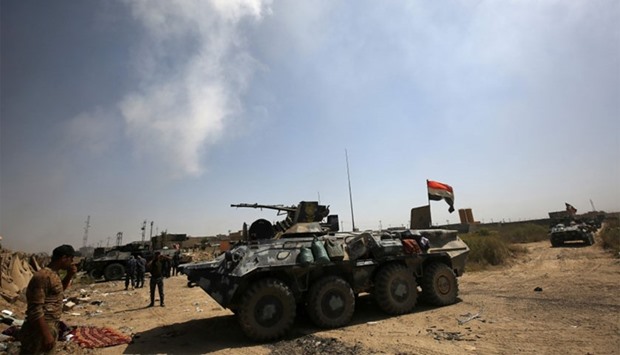Security forces have retaken significant parts of southern Fallujah since the start of the month and are now attacking the jihadists in the Jbeil neighbourhood, officers said.
"Counter-terrorism forces as well as federal and Anbar police continue the operation to liberate Jbeil, in southern Fallujah, and face fierce resistance from Daesh (IS)," a police colonel said.
Ground forces backed by Iraqi and US-led coalition air strikes alternated barrages of artillery fire with attempts to move forward in street battles, engaging with light weapons sometimes only metres (yards) away from IS fighters.
In an apparent attempt to distract Iraqi forces in Anbar province, where Fallujah is located, IS fighters attacked positions near Ramadi, the provincial capital that was retaken earlier this year, officers said.
Fallujah is a medium-sized, densely built-up town that lies only 50 kilometres (30 miles) west of Baghdad. It is one of the last two major Iraqi cities IS controls, the other being Mosul.
US forces suffered some of their worst losses since the Vietnam War when they battled one of IS's previous incarnations in the city in 2004 and it is one of the jihadists' most emblematic bastions.
Going against US advice to focus efforts on the northern city of Mosul, Iraq's Prime Minister Haider al-Abadi announced an offensive to retake Fallujah in late May.
The advance of pro-government forces has since been slow, with Fallujah's status as a symbolic IS stronghold and a tight siege by Iraqi forces ensuring holdout jihadists have few options other than fighting to the death.
Progress against the massively outnumbered jihadists has also been hampered by IS's systematic use of civilians as human shields.
'No safe passage'
According to the International Organization for Migration, at least 43,000 people have been displaced since the start of the operation more than three weeks ago.
But most of them were fleeing IS rule in outlying areas while residents of central Fallujah have found it very difficult to escape.
Attempting to do so has proven extremely dangerous, with roadside bombs and IS gunmen killing dozens of civilians in recent days.
The Iraqi army opened a corridor last week to facilitate the flow of civilians seeking to leave.
It has allowed thousands to escape but remains hard to reach from some neighbourhoods and dangerous to use.
On Tuesday, a man was killed and several other people wounded when an explosive device went off just metres (yards) away from the end of the corridor, where government forces receive fleeing civilians, the Norwegian Refugee Council reported.
"Let's be absolutely clear: there is no safe passage out of Fallujah to speak of," NRC country director Nasr Muflahi said in a statement.
Thousands of men among those trying to flee were being held for screening by pro-government forces and allegations of abuses were mounting.
In the displacement camps of nearby Amriyat al-Fallujah, those men who made it through the screening said Shia militiamen from the Hashed al-Shaabi paramilitary umbrella group were torturing suspects.
A 35-year-old man from an area just west of Fallujah displayed deep cuts on his wrists.
"That's from having my hands cuffed for four days, with nothing to eat or drink," he said.
"When they eventually pushed me off a moving pick-up truck, I was so exhausted I didn't even feel anything," he said.
Abadi's office has promised to investigate allegations of abuses committed by the security forces during the operation.
Fallujah and the areas around it are Sunni Muslim while the Hashed forces fighting alongside the government are dominated by Shia militias, some of which are supported by Tehran.
Their involvement in the operation had raised fears the battle would see collective revenge against Sunni civilians.
Men who claimed to have witnessed torture by anti-IS forces told AFP that the militiamen said openly they were motivated by revenge for the Speicher massacre, when up to 1,700 mostly Shia cadets were executed by IS near Tikrit in June 2014.

